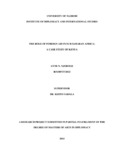| dc.description.abstract | This thesis discusses the role of foreign aid in Sub Saharan Africa. Foreign aid or Official
development aid as a came up in 1945 and was adopted by the United Nations as a measure
geared towards promotion of social progress and better standards of life. Foreign aid is of
particular importance to Africa’s human development programme. The hypothesis states that
foreign aid has had a positive impact on Sub-Saharan Africa’s development Agenda and that
poor policy environment in Sub-Saharan Africa has been a cause of ineffective application of
foreign aid. The thesis uses Kenya as a case study and notes that foreign aid to Kenya is policy
based with donors supporting Kenya’s development strategies which are tied around sectoral
reforms and the Vision 2030. The economic rationale for aid is based on the claim that the
macroeconomic contribution of aid to recipient countries is positive through the promotion of
improved economic policies and resource allocation. Africa is aid dependent, not only in terms
of the quantity of aid but in terms of the institutional mechanisms of this aid flow. Foreign aid
has caused all manner of debate in the study of international relations. There are scholars who
are for foreign aid and those who are against foreign aid. Pro-aid scholars feel that aid helps
developing countries’ economies and also helps improve human development especially in
countries with sound political and economic policies. Scholars against aid state that aid creates a
“moral hazard” problem (Samaritans dilemma), meaning that governments can spend money
without a firm budget constraint, confident that donors will bail them out of any difficulty.
Donors, who want to help (or are committed to send money for other reasons), may be forced to
oblige. This group of scholars also feel that by paying big salary premiums, large donor projects
can “poach” good people away from government, weakening its institutions and that recipients
governments overstretch themselves and in situations where focusing on priorities is important,
recipients will often prefer to expand their operations to cover whatever projects donors wish to
fund, especially since such funding often creates perks for officials. | en_US |

